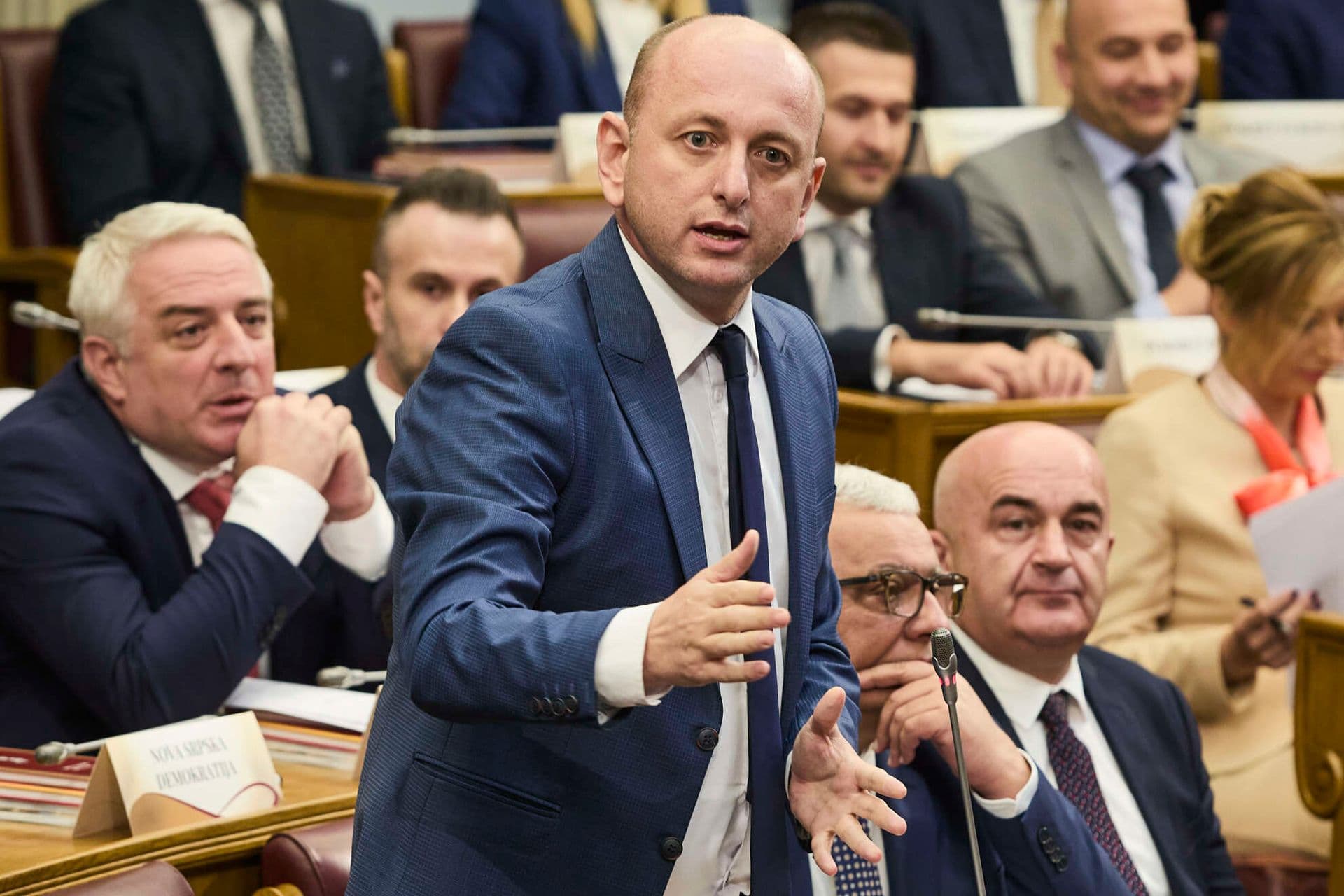Top Stories
Knežević Critiques Political Accountability Amid Legal Concerns

Milan Knežević, the leader of the Democratic People’s Party (DNP), has voiced strong criticism of the current political climate and the actions of Milorad Marković, the State Prosecutor. Knežević’s remarks raise significant concerns about accountability and transparency within the legal system, particularly as the deadline for a critical report approaches.
During an appearance on TV Prva, Knežević stated that Marković’s unwillingness to resign, despite lacking the support of 41 parliament members, undermines the legitimacy of the State Prosecutor’s Office (VDT). He emphasized that even if Marković continues to hold the title, without parliamentary backing, the office lacks credibility.
Concerns Over Legal Accountability
Knežević highlighted that Marković’s performance falls short compared to former prosecutor Ivica Stanković. He accused Marković of failing to engage effectively in his role, claiming that his focus is limited to annual reports detailing minor offenses, rather than pursuing substantial legal accountability. Knežević stated, “Marković thinks he can participate in panels for €6,000 and provide a yearly report on petty crimes.”
He also addressed the necessity for legislative changes, suggesting that the Law on Prosecution should mandate that both the State Prosecutor and the VDT appear before the Parliament. Knežević believes this adjustment would clarify the consequences if their reports do not receive legislative support.
Knežević expressed concern about the ongoing investigations related to the Telekom case, asserting that Marković has been negligent in addressing these issues. He noted that recent developments indicate a potential cover-up, stating, “Marković bears the greatest responsibility for the Telekom statute of limitations, as he had the opportunity to address key witnesses.”
Environmental and Community Concerns
Beyond the political and legal discourse, Knežević also addressed environmental issues in the region, particularly regarding the proposed wastewater treatment facility in Botun. He criticized the government’s plans, claiming that the project would exacerbate existing pollution problems. “Zeta is already endangered by pollutants,” he explained, referring to a recent decision to establish a wastewater treatment plant near the toxic “Red Sludge” pool.
Knežević pointed out that the local population is deeply affected by these environmental challenges, citing alarmingly high rates of cancer and other health issues. He argued for alternative locations for the treatment facility, suggesting that community input is crucial in decision-making processes.
“As citizens of Botun, we have never been consulted about these projects,” Knežević stated. He is adamant that any development should not proceed without community agreement, especially when it directly impacts public health and safety.
Knežević concluded by urging collaboration between local communities and political leaders to ensure that projects like the wastewater facility do not harm residents. He implored the decision-makers, “We need to reach a compromise before it’s too late.”
This ongoing discourse raises important questions about political integrity and the responsibility of public figures to prioritize the well-being of their constituents. As the situation unfolds, the actions and decisions made by leaders will undoubtedly influence both the political landscape and the health of local communities.
-

 Entertainment2 months ago
Entertainment2 months agoAnn Ming Reflects on ITV’s ‘I Fought the Law’ Drama
-

 Entertainment3 months ago
Entertainment3 months agoKate Garraway Sells £2 Million Home Amid Financial Struggles
-

 Entertainment2 months ago
Entertainment2 months agoCoronation Street’s Carl Webster Faces Trouble with New Affairs
-

 Health2 months ago
Health2 months agoKatie Price Faces New Health Concerns After Cancer Symptoms Resurface
-

 Entertainment2 months ago
Entertainment2 months agoWhere is Tinder Swindler Simon Leviev? Latest Updates Revealed
-

 Entertainment3 months ago
Entertainment3 months agoKim Cattrall Posts Cryptic Message After HBO’s Sequel Cancellation
-

 Entertainment2 months ago
Entertainment2 months agoOlivia Attwood Opens Up About Fallout with Former Best Friend
-

 Entertainment2 months ago
Entertainment2 months agoMasterChef Faces Turmoil as Tom Kerridge Withdraws from Hosting Role
-

 Entertainment3 months ago
Entertainment3 months agoSpeculation Surrounds Home and Away as Cast Departures Mount
-

 Entertainment3 months ago
Entertainment3 months agoMarkiplier Addresses AI Controversy During Livestream Response
-

 World2 months ago
World2 months agoCole Palmer’s Mysterious Message to Kobbie Mainoo Sparks Speculation
-

 Entertainment2 months ago
Entertainment2 months agoITV’s I Fought the Law: Unraveling the True Story Behind the Drama











